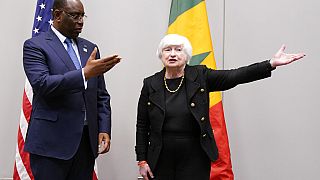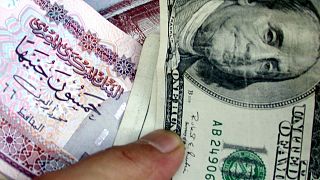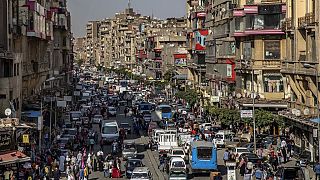Egypt
Egypt's pound reached a new low against the dollar Wednesday to the great dismay of Egyptians.
The devaluation now represents a drop of around 50 percent against the greenback over a 10-month period.
The country's economy was further unsettled by the consequences of the war in Ukraine with some global investors choosing to pull billions out of the North African country.
"Prices went up recently, especially since the Ukrainian war", grocery shop owner Mohamed Mahmoud laments.
"There is a shortage in grains. Many wholesalers, who used to deliver the goods to us, started closing. And the increase in prices affected us, so we now buy half a kilo instead of one."
With costs driven up further by higher global energy prices, official inflation hit 21.9 percent in December, and food prices rose 37.9 percent year-on-year.
"I stopped buying meat. Chicken prices have now risen to 60 Egyptian pounds for one kilo. I have three children; how will I cover their needs?" Ramadan Saleh asks.
"Prices are changing every day. Each merchant sells the goods for different prices. The problem is that we have no control over the markets. Markets should be controlled, as every merchant is selling based on their own prices."
Egyptian PM Mostafa Madbouli told ministers earlier this week to cut budgets and announced a moratorium "on new projects that have a clear dollar component".
Experts warn more economic pain is to come.
"The inflation experienced over the past year will persist for at least another year as these shocks to the currency are absorbed," Timothy Kaldas, a policy fellow at the Tahrir Institute for Middle East Policy, said.
IMF Mission Chief for Egypt said forecasts showed the country's economy was likely to fall back to around 7% by 2024-2025.













02:09
In a bid to aid its economy, Lebanon hopes to return to golden age of tourism
01:08
OECD revises forecast, projects slowdown in global economic growth
01:05
U.K-Egypt: Mother of jailed activist hospitalised amid hunger strike
02:20
Tarik Saleh returns to Cannes with explosive political thriller ‘Eagles of the Republic’
Go to video
El-Sissi and Aoun urge Israel to end strikes on Lebanon
Go to video
UN raises alarm over Egypt’s proposed criminal procedure code